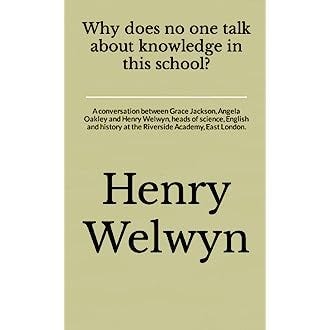Do you think our school is too strict?
This is an extract from a longer conversation about knowledge, teaching and schools. The full text is available here.
Henry Welwyn: I’m interested in the point you made about behaviour systems. Do you think our school is too strict?
Angela Oakley: I don’t think there’s anything wrong with being strict. My mum was super strict, and I’m grateful to her for it. But I think that as teachers we occupy a very different position to that of parents. We are representatives of the state, and I think it’s problematic when a state-funded organisation, staffed mostly by white teachers, is going into a diverse area like this one and punishing students for failing to adhere to rules imposed by people who do not represent the community.
Grace Jackson: Are you saying we shouldn’t have rules, then?
AO: That’s not what I’m saying, no. What I’m saying is that we are representatives of a democratic state and that we must therefore make sure we have democratic processes in place to decide on the rules we must all adhere to.
GJ: Such as?
AO: Such as ensuring students have a voice within the school. Such as maintaining close links with parents and never forgetting that the role of the school is to serve our community. Maybe even such as teachers co-constructing the rules of their classroom together with their students so that everyone is bought in.
GJ: So you’re against centralised behaviour systems?
AO: My concern with centralised behaviour systems is that they represent a kind of faceless, bureaucratic power. There are teachers in this school who use this behaviour system in a way that benefits themselves rather than the students. They hide behind the system because they haven’t put the work into building those relationships. What this leads to is students not respecting them: they obey through fear of punishment, not because they think they should. You end up with a sort of doublethink, where students say what they need to say to stay out of trouble, but don’t really believe in it. And if this is the case, then have we really educated those students? Have we changed who they are as people or have we just changed the way they behave within that building?
Then there are the ones who refuse to conform. They refuse to accept the rules and end up being excluded from class, then from school, and ultimately from society. And, like we said before, who are those students who are most likely to end up getting excluded? It’s those ‘low ability’ ones again, the ones who happen to be predominantly from working class and minority backgrounds.
GJ: But I’ve seen you teaching, Angela. You’re one of the strictest teachers in the school! And I’ve definitely seen you exclude students from your classes because they’ve been disrupting your lesson. I don’t see how you can argue against that.
AO: I can be strict because my students respect me. They also know how deeply I care for them. I am from this community: I know what it is like to grow up here; I know the challenges they’re facing; I also know what it’s like to bring up children here, given I’ve got two of my own. That stuff matters.
GJ: Which is all well and good, but does this mean we should only recruit teachers who grew up in the same community as the school? That doesn’t seem feasible, or indeed desirable. I’m not from this community, and I think I do a pretty decent job of teaching science. So, assuming we can’t and don’t wish to do that, what hope does a new teacher, fresh out of university, have if they’re going to teach at a school that doesn’t have a centralised behaviour system? It takes years to earn the kind of respect you’ve accrued; do they just have to suffer while they wait for it to build up? If so, well, they’re probably going to get sick of teaching altogether and leave the profession, or maybe they’ll go and find a nice, cushy job in an international school where the students actually respect them. Isn’t the kind of thinking you’re advocating a major part of why we have a retention crisis?
AO: The reason we have a retention crisis is because of ever-increasing accountability coupled with ever-decreasing autonomy! Teachers are constantly being told what to do and how to do it, and if they dare to have an opinion of their own — to, shock horror, act as thinking, reflective professionals — then they live in constant fear of being thrown off the bus altogether. I’m lucky in that sense: because I have been around the block a bit and get results, I know they’re unlikely to just get rid of me, but even then I’m still having to argue constantly with SLT about how I should do my job. It’s a nightmare. If I didn’t love the kids so much, I’d have left a long time ago. Maybe they’d be happy if I did leave; they could just put on one of those online video lessons and get the kids working in silence that way.
HW: It’s interesting, Angela, that you’ve essentially made the same point three times: once regarding knowledge, the fact that students who don’t accept the need to learn Shakespeare are branded as low ability; once regarding behaviour, the fact that students who refuse to play by the rules end up getting excluded; and now regarding teacher autonomy, the fact that teachers who want to adopt their own methods are likely to be forced out. Do you think the same thing is going on in each case?
AO: I think so, yes. I think in the last ten or fifteen years education has been taken over by a small group of people with a very clear ideological agenda — I’m thinking Michael Gove, Michael Wilshaw, those sorts of people — an agenda that’s tied up in the whole academies and free schools movement, in the changes to the National Curriculum, in the way we’re being asked to teach now and how that’s all bound up in the new Ofsted inspection framework. And I think that whole agenda is based on a very narrow idea of what it means to live a good life. Basically, those people believe that everyone should be reading Dickens or Jane Austen -
GJ: Or Shakespeare.
AO: Exactly! Or Shakespeare, and they effectively think that if you don’t read those sorts of books, and if you don’t have an encyclopaedic knowledge of the Battle of Hastings and the Magna Carta, and if you don’t have this deep love of biology or chemistry or physics, well, in that case, you must be somehow deficient. Likewise, if you don’t come from a culture based on sitting and discussing the news at the dinner table, if you don’t hold yourself in a certain way when walking around the school, if you’re expressive and passionate rather than being all English and restrained, then you’re labelled as some sort of miscreant and sent to the isolation room. And if you’re a teacher who doesn’t believe in all that cognitive science, retrieval practice, direct instruction nonsense; if you believe that teaching is about passion and enthusiasm and love; if you’re more interested in building relationships between you and the students than having arguments about whether they’re allowed to have their coat on or not, then you run the risk of being told that you don’t know how to teach and being placed onto a support plan. And it’s all in service of this ideal of Britishness — ‘British values’, that old chestnut! — this middle class, middle aged, typically male idea of what we should do, how we should behave, who we should be. Grace, you’re shaking your head. You don’t agree with me.
GJ: I mean, I kind of see your point, but I can’t get on board with a lot of what you’re saying. We’ve talked about Shakespeare already and I don’t want to go over that again, but I really don’t see how you can argue that teaching young people about science is some sort of middle class indoctrination.
AO: But do we teach them about science, or do we just ask them to memorise a bucket load of scientific facts that they don’t really understand? That’s certainly my memory of being taught science, although I appreciate that was a while ago.
GJ: The two aren’t mutually exclusive! It’s not an either/or between understanding and facts: the understanding comes through learning the facts. There’s a body of evidence showing how we need a broad base of knowledge to be stored in our long term memory in order to solve more complex problems or carry out more complex tasks. And that’s not just true in science, that’s true in English too. That’s why knowledge organisers are so powerful: they help students commit the core knowledge into long term memory so that when it comes to solving a problem, or writing an essay, or interpreting a newspaper report, or whatever, students’ working memories are not overloaded.
AO: You know my thoughts on all that working memory, long term memory stuff, Grace …
GJ: I know all too well, Angela, but again I just don’t get how you can argue that applying the verifiable findings of cognitive science is part of some middle class crusade against society. Surely it’s just good teaching?
AO: Is it? Let’s take knowledge organisers as an example. I saw one made by someone in my department recently. It had the definition of the word ‘hubris’ on: ‘excessive pride’. Students were able to parrot the fact that hubris means excessive pride, but when I asked them to give me an example of hubris, they looked at me like I was from Mars! This is what I’m saying: teaching English is about more than teaching knowledge.
This is an extract from a longer conversation about knowledge, teaching and schools. The full text is available here.

